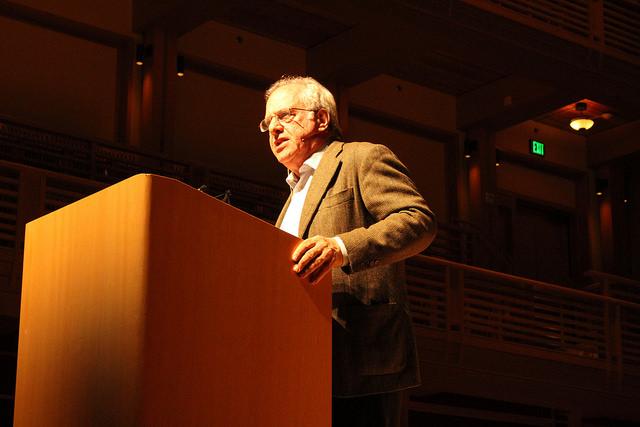Economics as a study, introduces how capitalism functions and benefits our American society. Yet that’s where it ends in regards to critical analysis, shared Richard A. Wolff last Monday in the Green Music Center at Sonoma State University.
His talk, Alternatives to Capitalism, is one of the many social justice lectures series donated by Andrea Nettle, a former professor of education at Sonoma State.
Wolff is a Marxist economist who received his Ph.D. in economics from Yale University and attended both Harvard and Stanford.
“We debate our transportation systems. We’re debating our health system and our insurance system, a lot of systems that make up our society. But we don’t debate our economic system, do we? Why not?” said Wolff.
Wolff referenced recent American history to explain the issues with capitalism.
“American workers in the 1970s were well paid, and better paid than anywhere else in the world,” Wolff said. “The more successful workers are at fishing up their wages, the greater the incentive they give to the employer to find a cheaper substitute.”
The elevated wages resulted in business’ leaving the United States to obtain higher profits by achieving minimal expenses.
“That’s how capitalism works. It rewards [business’] if they [utilize cheaper wages], and punishes [business’] that don’t,” said Wolff.
Wolff explained that there are alternatives available. There are democratically run corporations domestically and internationally, containing large and smaller scale examples. These corporations are called worker cooperatives.
Worker cooperative is the operation of worker-owners as investors and owners of the company, which results in all worker-owners to receive profits of the company as well as getting an equal vote to changes and direction of the company.
Alvarado St. Bakery in Petaluma has been a worker co-op for over 35 years, since it opened in 1981.
Wolff also introduced worker cooperatives that are large scale, with over 100,000 members, called the Mondragon Corporation in Spain. The highest paid worker cannot make more than eight times the lowest paid worker. CEOs of non-worker cooperatives can make up to 300 times more than their lowest paid worker. According to Wolff, the Mondragon is highly successful as a cooperative and ranks tenth-largest corporation in Spain.
“Co-ops can exist within a capitalist system. They are often fantastic contributions to capitalist economy, but they certainly are not going to resolve all the problems of capitalism,” said Michael Visser, a Sonoma State professor of economics. “It’s a little bit misleading to offer radical criticism of capitalism that is consistent with Marxist ideology but then favor a certain intermediate type of solution like co-ops.”
Visser found the lecture enjoyable, and acknowledged Wolff’s excellent speaking style and discussion of important issues. Although, Visser is concerned with Wolff’s rhetoric and characterization of all economists.
Despite Wolff’s education in economics, there were aspects in which he was never required to focus.
“I studied economics among my other topics. I had my Ph.D. from Yale economics. In the ten years that I spent in Harvard, Stanford and Yale, I was never required to read one word of criticism of capitalism,” said Wolff.
Visser on the other hand, focuses his work on poking holes in the capitalistic society.
“As an academic, it is part of my job to demonstrate an ability and willingness to question the seemingly unquestionable,” said Visser about his role in questioning the economic status quo.
“Today probably more than ever we need to be talking and thinking about the distribution of advantages and disadvantages within a society,” said President Judy K. Sakaki at Monday’s lecture. “Everyone deserves equal economic, political and social rights and opportunities. Every single person.”
Wolff applauded Sonoma State for making his lecture available to students.
“Maybe you can be the vanguard and begin to demand the courses, the studies, the research [and] the books so that you can learn about the alternatives to capitalism. [So] that you can catch up with the rest of the world that has been debating the strengths and weaknesses of capitalism for a long time,” said Wolff.



































